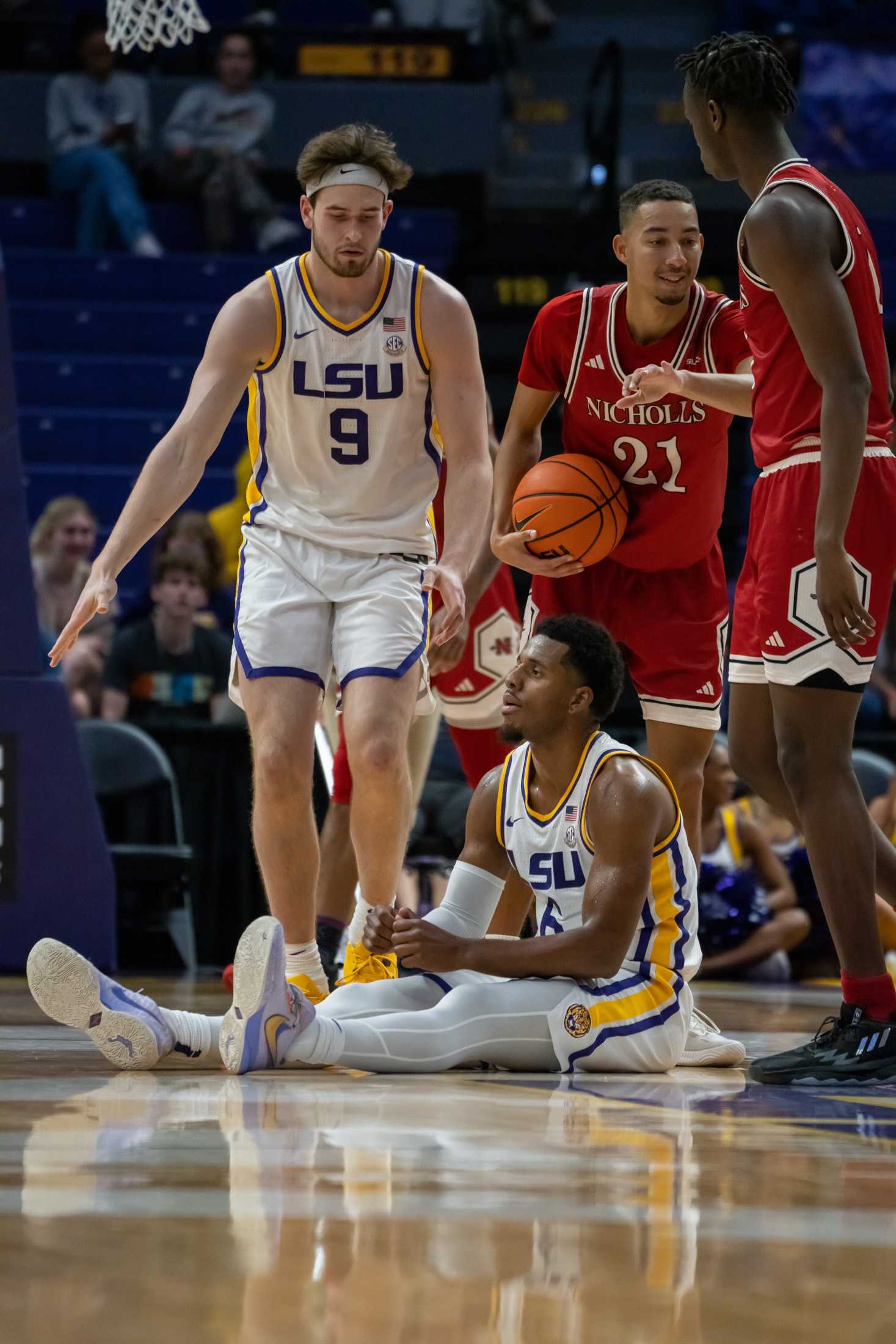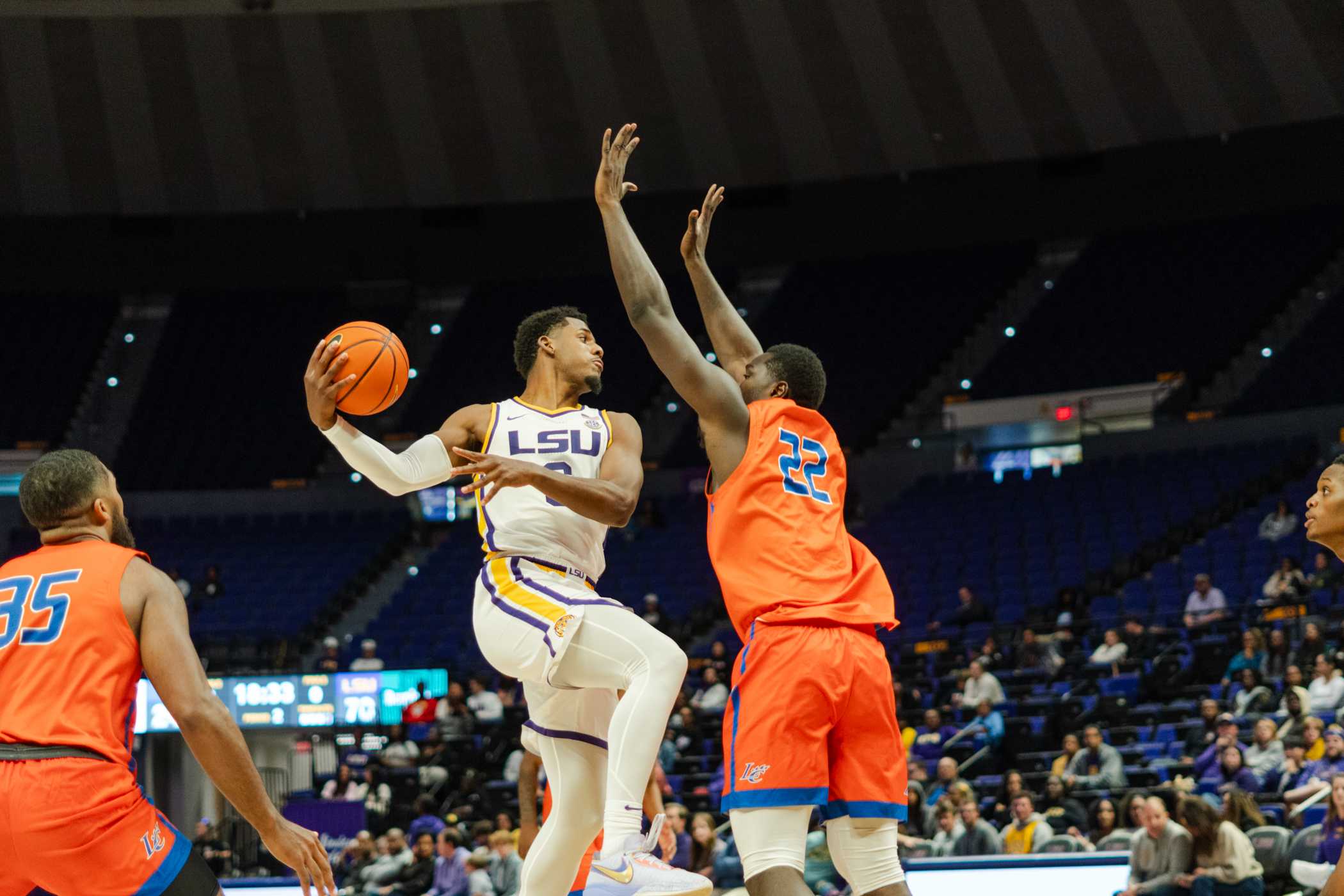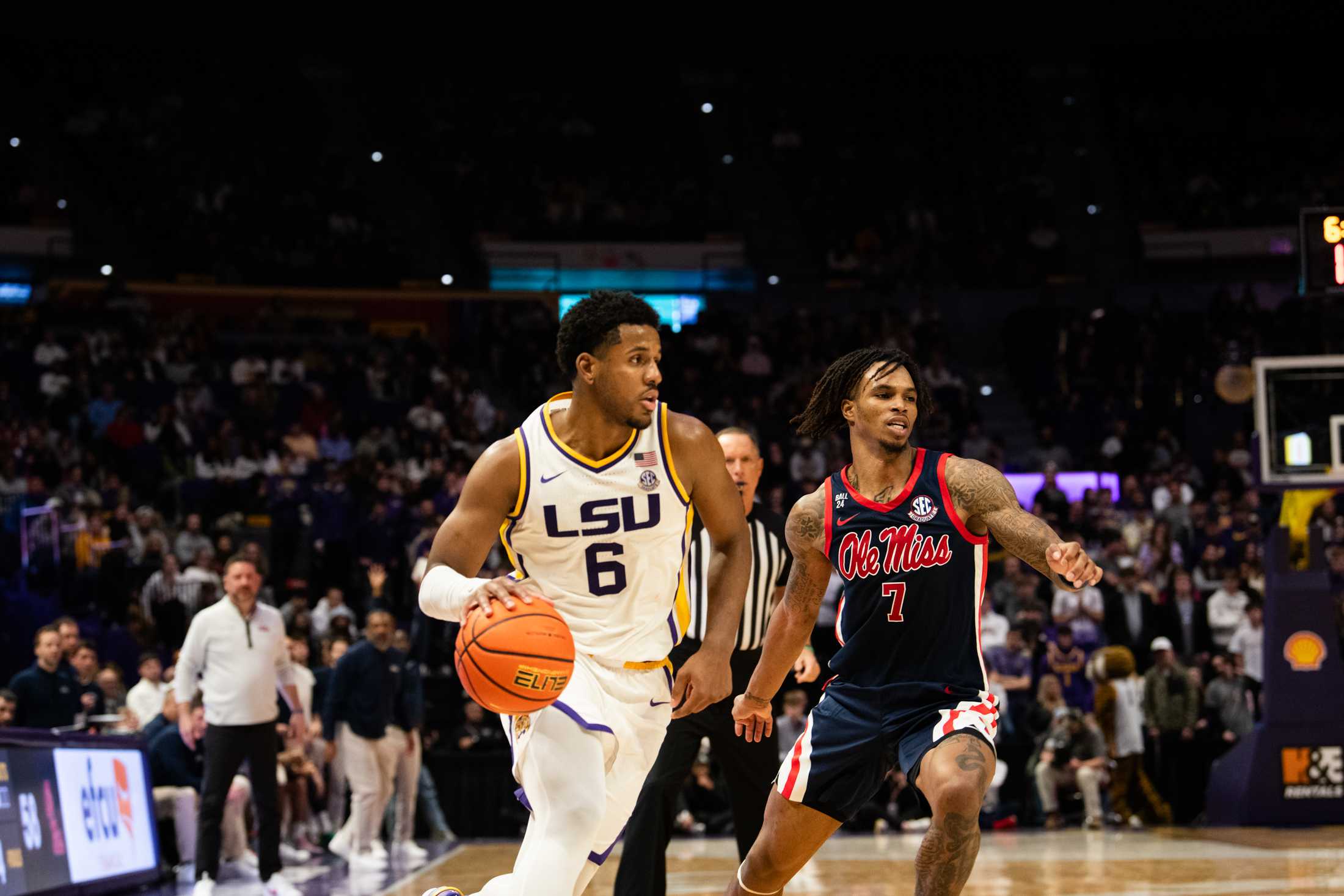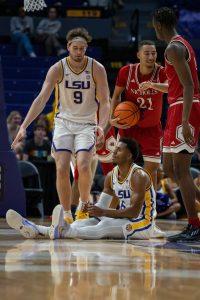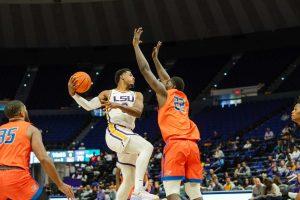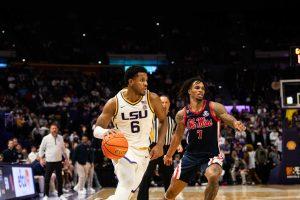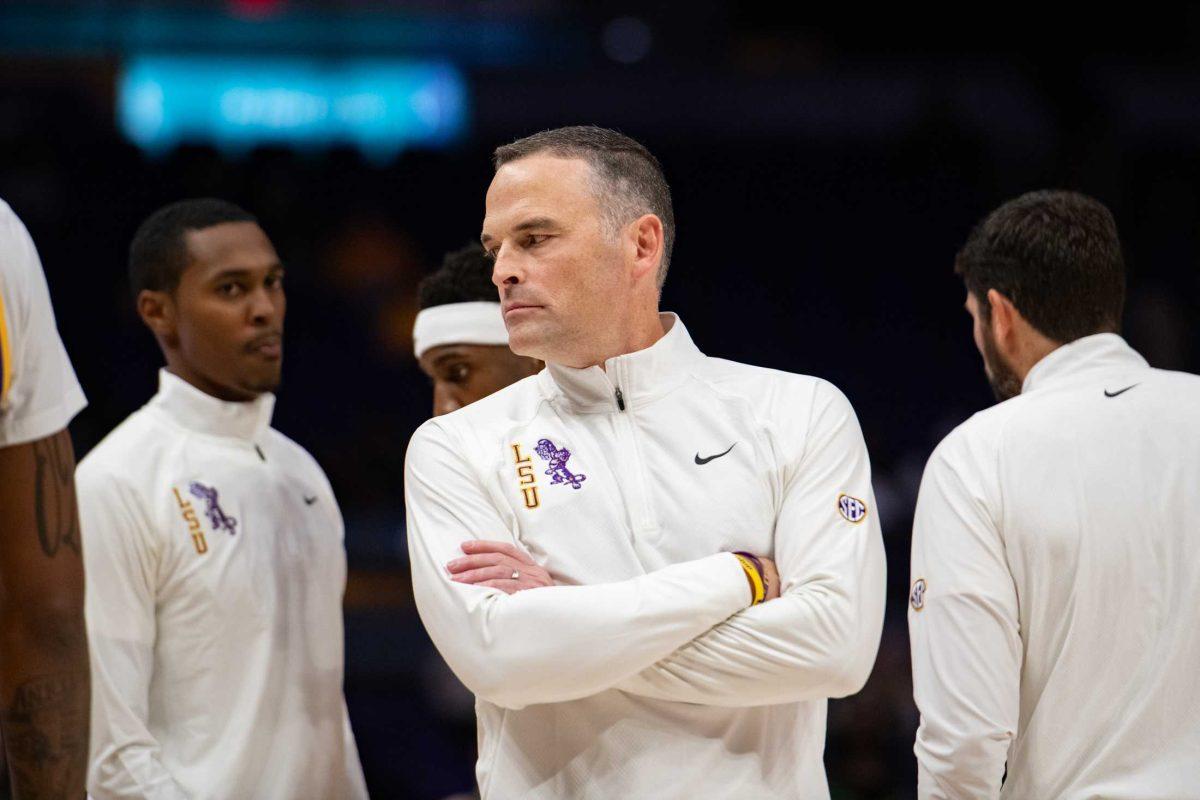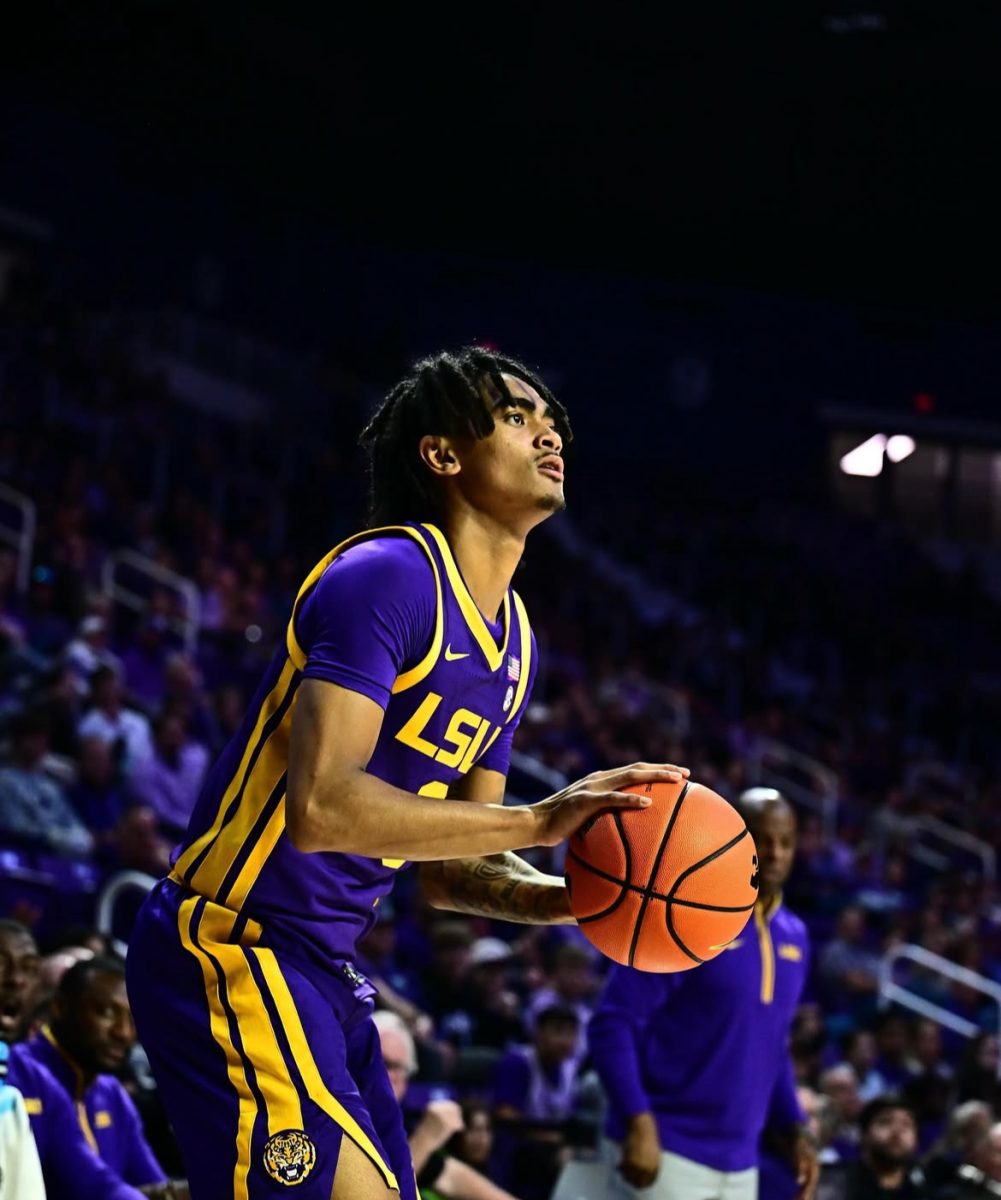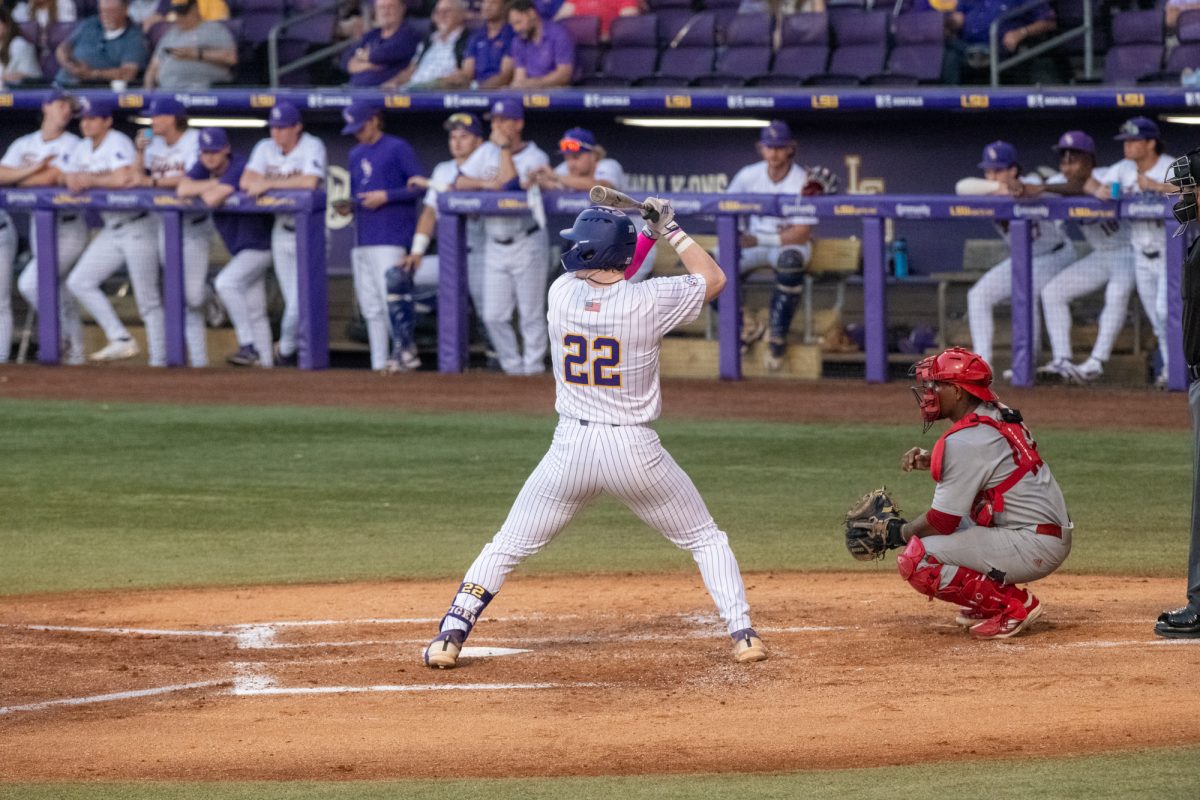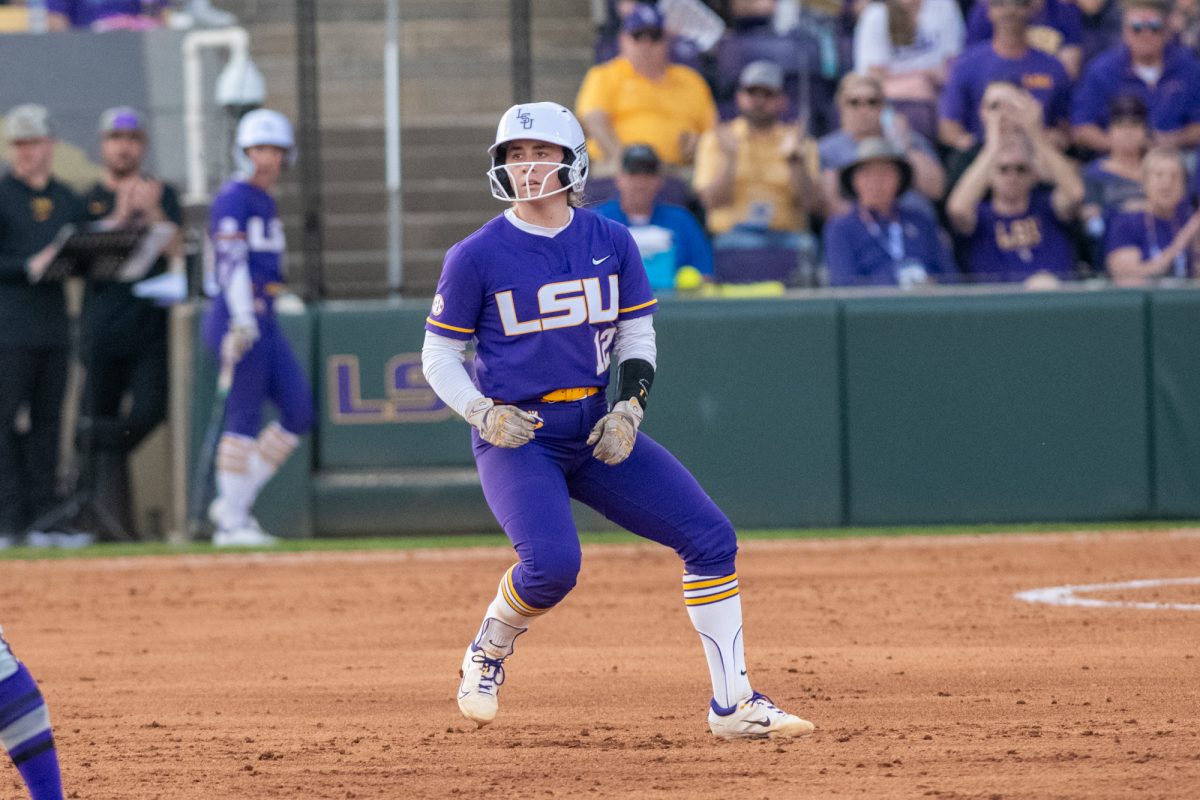Most athletes wouldn’t make fundamental changes to their game in their fifth year of college.
Most athletes, though, aren’t Jordan Wright.
In this, his final year of collegiate eligibility, Wright is still adding to his repertoire as he tries to help boost an LSU team in the midst of a rebuild.
He’s slimmed down from last season, allowing him to move with more speed and force, which is most noticeable in his highlight reel dunks and blocks in transition.
He’s also taken the next step as a 3-point shooter, having hit 36.3% of his shots from deep so far this season on a healthy 5.1 attempts per game. In his prior season, Wright made 31.3% of his 3-pointers.
“Credit to him, I think he’s put a lot of work in,” LSU head coach Matt McMahon said early in the season. “He’s just relentless in his approach to improving his consistency beyond the arc.”
Though it’s become a cliché, Wright is a first-in, last-out player and often beats McMahon to the gym in the morning. Going the extra mile is just the norm for him.
READ MORE: What went wrong in LSU women’s basketball’s loss to South Carolina
It’s that work ethic that made Wright a great player going back to his prep days at the Dunham School in Baton Rouge, and it’s why Dunham officially retired his jersey on Monday night.
‘He put us on the map’
The Dunham School’s gymnasium was standing room only, with Wright’s teammates, both past and present, gathered among the many to see his No. 32 jersey hung on the arena’s walls.
Wright looked gleeful as he waved to old friends in the stands and hugged his former coaches, Jonathan Pixley and Chad Myers.
“[Without Jordan], the players that were here don’t work like they worked,” Pixley, who stepped down as head coach in 2021 to make way for Myers, said during the ceremony. “The standard would not be what it was.”
“I never thought this would even be possible,” Wright said after the jersey was unveiled, making him the first Dunham basketball player to have his number retired. “This is something that I couldn’t even have dreamt of as a kid.”
Wright’s resume at Dunham speaks for itself: He’s the school’s all-time leading scorer and rebounder, and he kick-started the most successful run in Dunham basketball history.
He led Dunham to three straight appearances in the LHSAA Division III State Championship game, winning one in his junior year in 2018, Dunham’s first championship in basketball since 1998. Dunham would appear in and win two more Division III championships consecutively after Wright’s graduation, something he helped set the foundation for.
For his performance in the 2018 championship run, Wright was named the most outstanding player of the state tournament, in addition to being a three-time All-State and district MVP.
“He put us on the map,” Myers said. “Everybody now knows who Dunham basketball is to this day because of the stuff that he and his teammates did.”
Myers was an assistant coach for Dunham under Pixley when Wright played from 2015-19, and said he and Pixley knew Wright was their best player even as a freshman.
MORE SPORTS: What does Nebraska volleyball have that LSU doesn’t, and how does it get there?
Standing at 6 feet 5 inches, Wright was the type of player who might get pigeonholed into playing as a back-to-the-basket, traditional big man in a smaller high school division. Pixley and Myers, though, noticed Wright’s unique vision as a passer.
“Most people [would say], ‘Oh, just put him in the post,’ or whatever. Well, no, he’s not a post player. He’s a guard,” Myers said. “Really and truly, he was probably our best point guard.”
As a freshman, Wright quickly adjusted to the speed of the game, showing off the playmaking chops that Pixley and Myers had seen as Dunham fell in the state quarterfinals.
“He did a great job of trusting his teammates, even at times when maybe he shouldn’t have,” Myers said. “That gave those other guys so much confidence.”
Wright’s abilities to elevate the play of those around him, as well as his own investment in diversifying his shot selection – he worked with Pixley to mix in stepbacks and floaters and improve his outside shot – were the driving force of Dunham’s incredible three-year run that followed.
His talents extended off the court, where he was a 4.0 student while taking Advanced Placement and honors courses. Academics were never secondary for Wright or for his mother, who Pixley said wouldn’t hear his pitch for Wright to come to Dunham until she was assured that his education would be in good hands.
“He is the true definition of a student-athlete,” Myers said. “He didn’t coast. He took care of his business in the classroom, he took care of his business on the court.”
Perhaps nothing better illustrates Wright’s commitment to scholarship than the fact that his final two choices for college were Tulane and Vanderbilt, two elite academic institutions. Wright, a three-star recruit according to 247Sports, ultimately chose to play for the Commodores under first-year head coach Jerry Stackhouse.
Even as he moved on to bigger things, Wright didn’t forget his roots. Myers says he consistently stays in touch and always asks about his children by name.
“He’s not too big for anything,” Myers said. “When he comes back to Dunham, it’s like he never left.”
Homecoming
At Vanderbilt, Wright entered a program coming off a 9-23 season, including an 0-18 record in Southeastern Conference play. By the end of his four years in Nashville, Wright had helped take the Commodores to the National Invitation Tournament twice and stayed the course for a program on the mend.
Of course, he did all of that while also making the SEC’s academic honor roll three times and being named the SEC’s scholar-athlete of the year in 2022.
When he made the decision to exercise his last year of eligibility as a graduate student and transfer back home to LSU, he once again faced a difficult challenge. The Tigers went 14-19, 2-16 in conference play the year prior.
It wasn’t unfamiliar territory for Wright. He elevates programs: it’s what he does.
Wright averaged a respectable 9.5 points, 4.7 rebounds and 1.1 steals during his time as a Commodore, but he’d never truly been the No. 1 option at Vanderbilt.
Instead, he’d been a jack-of-all trades type player: an elite defender and a great, hard-working rebounder, despite his size relative to opposing big men. He’d been the glue for his teams and a key on-court leader.
With expected lead guard Jalen Cook ineligible to play to start LSU’s season, Wright had to assume the top role. That’s where the improvements he’d made during the offseason, getting into better shape and working on his shooting, were most instrumental.
“It’s strange to say as a fifth-year senior, I think his practice habits have gotten better as the season’s gone along,” McMahon said. “I think that’s become contagious throughout our team.”
Wright drew from his work habits he’d gotten from his time at Dunham, where Pixley and Myers had made him “buy in,” including talking to him about his diet and weight.
“We knew he was talented, but he had to put in the work to get to that next level,” Myers said. “Not just rely on just pure talent, because that’s not going to work.”
As diligent as Wright is in the gym and as much as he’s mastered the hustle categories of the game, make no mistake: He’s a star, not just a gritty role player who bridges talent gaps by effort alone.
This season has been a career year for Wright in points (15.6 per game) and assists (2.7), and he leads the team in rebounds with 5.2 per game. While he’s had some inefficient games and taken some bad shots, it’s clear he’s taken the next step as an offensive engine.
He’s gotten to the basket with ease this year and has had his best season from beyond the arc, despite taking plenty of difficult shots and carrying a greater offensive load. In addition, he continues to be the team’s best player on the defensive end, ranking No. 3 in the SEC in steals with 2.1 per game.
In LSU’s conference opener, a win at Texas A&M, Aggies coach Buzz Williams came away stunned by Wright, remarking that Wright’s 20-point, 10-rebound performance was SEC player of the year-caliber.
“He’s really hard to guard,” Williams said. “He plays with such great force. However you want to handle the ball screen, whatever your decision is, he can beat you with power.”
Wright has also had games of 33 and 27 points, but perhaps none of his performances were more meaningful than his 15-point night against his former team, Vanderbilt.
“It was very important for me to get this win,” Wright said after the game, a 77-69 home victory for LSU. “I really, really, really wanted this win.”
LSU, currently 11-9 with a 3-4 record in the SEC, is clearly a significantly improved team. Much of that is due to Wright, who has his hometown Tigers at least within striking distance, with a strong finish, of an at-large berth to the NCAA Tournament.
That may be surprising to some, but not to those at Dunham or to Chad Myers, who saw him grow into the player he is.
“He has not exceeded our expectations,” Myers said. “This is what we thought of him the whole time.”





